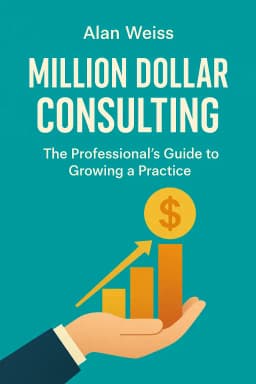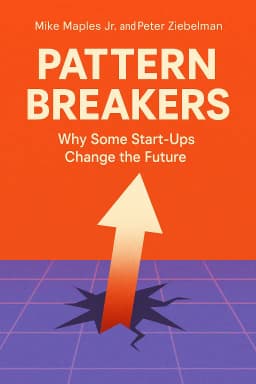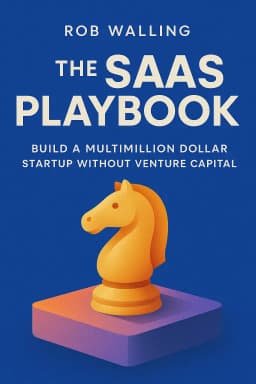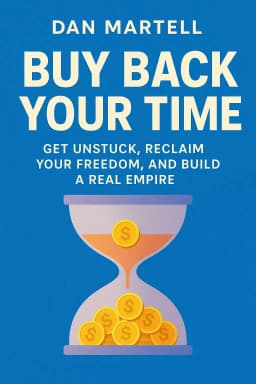
The Unscalable Advantage
Why Staying Small Is the Next Big Thing for Business
Golden Hook & Introduction
SECTION
Mark: What if the smartest thing your business could do this year is not grow? Not acquire more customers, not hire more people, not expand. What if the goal was to actively resist growth? Michelle: Okay, Mark, you've got my attention. That sounds like business suicide. It’s the kind of advice that gets you laughed out of a pitch meeting. What are you talking about? Mark: It’s the central idea in Paul Jarvis's book, Company of One: Why Staying Small Is the Next Big Thing for Business. And it’s a philosophy that has been gaining a lot of traction, especially among people tired of the whole "hustle culture" narrative. Michelle: A whole book about not growing? That’s definitely a contrarian take. Mark: It is. And Jarvis lives this. He famously left the city to run his successful design business from a remote, sparsely populated island off the coast of Vancouver, proving you don't need to be in a bustling hub to thrive. He felt like a "business weirdo," as he put it, for wanting to stay small, but when he wrote about it in his newsletter, the response was overwhelming. He tapped into a deep, unspoken frustration with the 'grow-at-all-costs' mantra. Michelle: I can see the appeal. The pressure to scale is immense. But is this just a lifestyle choice for a certain type of creative person, or is it a viable business strategy? I mean, what happened on this island that led to this epiphany? Did he just get tired of people? Mark: (Laughs) A little bit of that, maybe. But it was more about escaping the noise. In the prologue, he talks about leaving Vancouver because he was sick of the constant push from everyone to grow his already successful business into something bigger. Moving to the remote town of Tofino, where there was barely any cell service, forced him into a kind of mental decluttering. Michelle: So, isolation therapy for entrepreneurs. Mark: Exactly. And in that quiet, he realized he’d been unconsciously building a "company of one" for twenty years. His goal wasn't more, it was better. The book argues that a Company of One isn't defined by the number of employees—it can be one person or a small, dedicated team. It's a business that questions growth before accepting it as a default. Michelle: Okay, "questions growth." I like that phrasing. It’s not anti-growth, it’s growth-agnostic. So what defines this kind of company? Mark: Jarvis lays out four key traits: Resilience, Autonomy, Speed, and Simplicity. They're the pillars that allow a small company to be more robust and often more profitable than a bloated corporation. Michelle: Autonomy and simplicity sound great, but 'resilience' can feel a bit vague. It's easy to be resilient when things are going well. What does that look like when things go wrong? When you’re facing real pressure to either grow or die?
The Counter-Cultural Mindset: Redefining Success by Staying Small
SECTION
Mark: That’s the perfect question, because the book has a story that is an absolute nightmare scenario for any founder. It’s about an author and entrepreneur named Danielle LaPorte. In the early 2010s, her business was taking off, and she bought into the idea that to be "legitimate," she needed to scale. Fast. Michelle: Ah, the siren song of venture capital. Mark: Precisely. She went out and raised $400,000 from investors. But there was a catch. The investors insisted she hire a "wunderkind" CEO to run the company. She was the founder, the face, the soul of the business, but they wanted a professional manager. Michelle: I have a bad feeling about this. This sounds like the beginning of a corporate horror movie. Mark: It gets worse. Within six months, the new CEO and the investors decided they wanted to pivot the business. They wanted to change the entire model. And in their new vision, Danielle's role—and her pay—was drastically diminished. They effectively fired her from the company she had built from scratch. Michelle: Oh, come on. That’s brutal. All because she tried to do the "right" thing and grow? Mark: Exactly. She chased growth and in return, she lost her autonomy, her vision, and her company. But this is where the resilience part comes in. After the initial shock, she didn't try to fight them or raise more money. She walked away. She started over, from zero. She built a new, small team, launched a simple website, and went back to what she did best: connecting with her audience. She rebuilt her entire business on her own terms, without outside money. Michelle: Wow. So the resilience wasn't in fighting back against the investors, but in having the strength to start over and stay true to her own vision. Mark: Yes. And in realizing that the "growth" she was sold came with strings that would have strangled her business anyway. Her story is the perfect cautionary tale. The pursuit of growth, especially funded growth, often means sacrificing the very autonomy that makes being an entrepreneur worthwhile. Michelle: That Danielle LaPorte story is a powerful warning against losing control. It makes the idea of staying small feel less like a lack of ambition and more like a strategic defense. But it still begs the question: how do you actually build a profitable business if you're actively resisting growth? How do you make more money by staying small?
The Unscalable Advantage: Building a Business That Doesn't Grow, But Thrives
SECTION
Mark: This is my favorite part of the book, because it’s a beautiful paradox. The book argues that you use scalable systems to protect and deliver your unscalable advantage. Michelle: Okay, you’re going to have to unpack that one for me. Scalable systems and unscalable advantage? That sounds like a contradiction. Mark: It does, but it makes perfect sense. Scalable systems are the tools that give you leverage without adding headcount. Think automation, software-as-a-service, outsourcing fulfillment, using freelancers for specific tasks. These are things that let you handle more business without hiring more full-time employees. You can use Shopify to run a multi-million dollar store, or Drip to automate your email marketing. Michelle: Right, so technology does the heavy lifting. That part is clear. What’s the 'unscalable advantage'? Mark: The unscalable advantage is the stuff that big companies, by their very nature, can't do well. It’s your unique personality, your deep expertise, and most importantly, a level of customer service that feels deeply human. It's the things that don't scale, and that’s precisely why they’re so valuable. Michelle: So you’re saying the goal is to automate the boring stuff so you have more time for the human stuff? Mark: Exactly. A great example from the book is the idea of "teaching everything you know." Most companies hoard their knowledge. They think their expertise is a secret sauce they need to protect. But look at Brian Clark, who started the website Copyblogger. Michelle: I know that site. It’s a huge resource for content marketing. Mark: It is now. But it started with him, a former lawyer, just writing and teaching everything he knew about online marketing for free. He didn't hold back. He gave away his best ideas. And by out-teaching his competition, he built an enormous, trusting audience. When he finally launched a paid product, people were lining up to buy it. His company, Rainmaker Digital, now does over $12 million a year. He didn't out-scale his competitors; he out-shared them. Michelle: That’s a great point. You build authority by being generous with your knowledge. But teaching is one thing. What about customer service? You can't build a real competitive moat with that, can you? A big company can just hire more support staff. Mark: But can they do this? The book tells a legendary story about RackSpace, a cloud hosting company. A support employee was on the phone with a customer, helping them through a technical issue. In the background, the employee overheard the customer say to someone else, "Man, I'm getting hungry, I wish we could order a pizza." Michelle: Okay…? Mark: The RackSpace employee put the customer on a brief hold, looked up their address on file, ordered a pizza to be delivered to their house, and then got back on the line and continued solving the technical problem. About thirty minutes later, while they were still on the call, the pizza arrived. Michelle: No way. That’s incredible. The customer must have lost their mind. Mark: They did! And they told everyone. That story went viral. It generated more goodwill and positive marketing than a million-dollar ad campaign. Could a massive corporation with outsourced call centers ever do that? Never. That's an unscalable act. It’s pure, delightful, human connection. That's the moat. Michelle: Wow. A pizza. It’s so simple but so powerful. It completely reframes what "customer service" can be. It's not just about solving problems; it's about creating relationships. Mark: And that's something a Company of One can do better than anyone. They can know their customers by name, by need, by motivation. They can send handwritten thank-you notes, like Sean D'Souza from Psychotactics, who sends his clients boxes of chocolates. These are the things that build unbreakable loyalty.
Synthesis & Takeaways
SECTION
Michelle: So it's not really about being small. It's about being the right size for the life and the business you want to run. It’s about defining 'enough' for yourself, whether that's enough money, enough clients, or enough time off, like that surfing accountant from the book who just took the rest of the year off once he hit his number. Mark: Exactly. The book's ultimate challenge is to shift your goal from 'more' to 'better'. And there’s a powerful historical example of this. Kongō Gumi was a Japanese construction company founded in the year 578. Michelle: Wait, 578? As in, over 1,400 years ago? Mark: Yes. It was the world's oldest continuously operating business. For fourteen centuries, they did one thing: they built beautiful Buddhist temples. They focused on being the best, on craftsmanship, on their relationships. They survived wars, famines, and political upheavals. Michelle: That’s an unbelievable legacy. What happened to them? Mark: In the 1980s, during Japan's economic bubble, they broke with tradition. They took on massive debt to expand into commercial real estate. They chased growth. When the bubble burst, they were left with $343 million in debt. In 2006, the world's oldest company was liquidated. Michelle: Oh, that’s heartbreaking. After 1,400 years, it wasn't a war that took them down, it was a spreadsheet. It was the disease of 'more'. Mark: It’s the ultimate cautionary tale. They stopped being a company of one—a company focused on being better—and tried to become a company of many. And it destroyed them. The book is really a guide to avoiding that fate. Michelle: It really makes you think. What does 'enough' look like for you? And what would you be willing to give up, or rather, what would you refuse to chase, in order to protect it? Mark: That's the question at the heart of it all. We'd love to hear your thoughts on this. Does staying small sound like freedom or a limitation? Find us on our socials and let us know what you think. Michelle: This is Aibrary, signing off.









